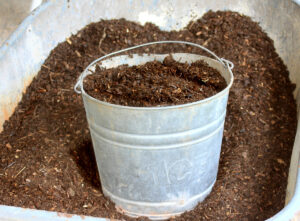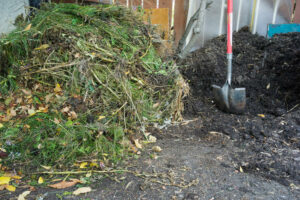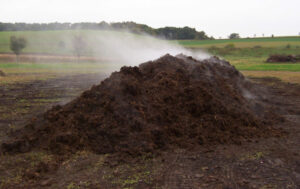Goals:
to preserve and improve soils;
increase crop yield;
stabilize soils against erosion, flooding and drought;
understand benefits and differences between compost and fertilizer;
identify productive amendments available to farmers and gardeners.
Means:
Compost and natural fertilizer;
application methods, crop rotation, and schedules;
preservation techniques for soil;
identifying specific needs and requirements;
continuing development of soil over time.
To preserve and improve soil, we need to take care of soil. That simple statement is often overlooked when we think about farms and gardens. We want more food to grow, and try to feed the crop directly. What we need to do is tend God’s garden. We should not try to redesign it! Soil is God’s gift. It will provide for us. We read in the Bible that God put the man He had made in the Garden of Eden, and our Bibles use the word to “tend” it. The Hebrew word is Raah,  which means to eat, consume, devour, or feed from. God put the man in the garden to eat! Only after the fall of man did we learn to toil by the sweat of our brow to eke out enough food to survive. Sin ruins even the land of God’s garden.
which means to eat, consume, devour, or feed from. God put the man in the garden to eat! Only after the fall of man did we learn to toil by the sweat of our brow to eke out enough food to survive. Sin ruins even the land of God’s garden.
We increase crop yield by taking care of the soil. The soil feeds the plants and provides a healthy home for good food to grow up in. In good soil, the land feeds the plants from its riches. When we change the soil, we interrupt the natural cycle that God gave us. If we put the wrong things into the soil or take too many things out without quickly replacing them, the living things in the soil start to die. That is the proper use of compost. It is food for the soil, so that the soil will be strong to tend to the food in the garden.
To stabilize soils against erosion, flooding and drought begins with organic matter. Nowhere on earth seems to be “just right” every year. We seem to get too much rain or too little rain. We do not know how to regulate the rain, but God does! He filled the earth with organic matter to soak up the excess rain and hold it for the plants when they need it! He carpeted the earth with plants, trees, bushes and grasses to maintain the moisture and cover the precious ground. He put deep roots on many plants to hold the soil from being washed away. Those roots also till the ground, carry water and nutrients up and down, and supply the keepers of the land with all they need.
The benefits and differences between compost and fertilizer can be thought of as food and medicine. Compost feeds the soil and the soil feeds and tends the plants and tiny creatures that grow in it. Fertilizer treats an illness or a deficiency, like a doctor gives you pills when you are sick. It is healthy to give sick soil good medicine when it is sick, but medicine will not keep it alive. Living soil is healthy soil. We know it is healthy when it grows healthy crops!
To identify productive amendments available to us is easier than you might think. “If it came from the soil, it goes back to the soil,” is the first important rule of composting. You can see this in the job cows have in the field. They eat from the field, and they return urine and dung to the field. While they do this service to the soil, they also provide us with milk and meat from the field. The nutrients that cows use to make milk and meat are replaced by bugs and worms that tend to the cow’s dung and urine. In simple terms, the cow eats grass and makes meat and milk, and returns what it used. Little creatures eat the remnant and add back the protein that the cow took away. (One special word of caution: do not put dung from a meat eating animal in your field or your compost. Never! We can look at this again later.)
 In this photo, “raw” compost is on the left. Finished compost is on the right. The process will take between a couple of weeks and a couple of months. Compost and natural fertilizer are the food that produces our food.
In this photo, “raw” compost is on the left. Finished compost is on the right. The process will take between a couple of weeks and a couple of months. Compost and natural fertilizer are the food that produces our food.
Application methods for compost are very simple. Spread it! Crop rotation is also simple. Do not plant the same crop in the same place season after season. Move it around. Schedules are once again very simple. Put compost on your soil as often and as thickly as you possibly can!
Soil preservation techniques mean one thing more than anything else: always keep your soil covered! If possible, always keep something growing in your soil, but if that cannot be done, keep it covered with compost or raw compost materials.
Identifying specific needs and requirements will quickly become less important as the soil improves. Compost will quickly add back all the missing ingredients to the starving dirt.
As we continue the development of soil over time, it will begin to take better care of us. Simply by returning what we take away, the nature God intended will be restored. Crops will automatically improve. The soil will look, feel, and smell better. Healthy little bugs and worms will return. Gardening will become a pleasure rather than a chore, and our bellies will be full!
Are you ready to learn?
The “art and science” of compost is as deep as the ocean! But we can do it without much knowledge. We can gain all the understanding necessary just by watching what happens! “The fear of the Lord is the beginning of wisdom, and the knowledge of the Holy One is insight.” – Proverbs 9:10
Anything that grew out of the ground must go back to the ground. “If it came from the soil, it goes back to the soil,” makes the first rule of composting about as simple as possible. When you go to the forest or grassland, what you see is growing things. You will see that grass is either growing or returning. Trees keep growing even in the dry season, and look just about the same all year long! Did you ever ask yourself why God’s untouched areas are so much healthier than our farms and gardens? Nobody tends the forests and gardens of God, except God. On the ground are the same growing things going back to the soil. Fallen leaves and branches, exhausted grasses and weeds stay where they came from. Look closely! Under a thick cluster of trees or bushes, you find a mat of decaying things. That is the tree going back to the soil. If you dig into that mat of decaying leaves and grass, you discover a layer of rich, black soil, called compost! If you dig a little deeper, you find healthy soil. While you dig, you will also disturb many bugs and worms. Although you cannot see them, you are also disturbing billions of bacteria in a small shovel full of rich soil. Sometimes you also see streaks of white or yellow. That is fungus. All of these things are making soil, balancing it, fertilizing it, moving it, and using anything that falls to the ground.
If you put all the things that come from the ground together, it will be like the floor of the forest. It will turn into rich compost. Banana leaves, coffee plants, squash stems, potato vines, egg shells, wood chips and twigs can all be piled up together. The more there is, and the more variety, the better the compost will be. Add cow dung, chicken, rabbit or goat dung, too. Better still, let your chickens loose on the compost! They will eat bugs and worms, the tastiest bits of left over plant scraps, and dig into the pile. As they dig, they will shift the pile around and add their own waste. One surprising addition to compost is urine! Human urine is one of the best composting “tools” of all. It adds the nitrogen and rich blend of nutrients that composting bacteria love. We will look at human urine in future articles, but for now, feel free to add it to your compost pile
 A good pile will get hot! This picture is steam coming from a compost pile on a chilly morning. This is a very good thing. Hot compost will cook the weeds and unwanted seeds.
A good pile will get hot! This picture is steam coming from a compost pile on a chilly morning. This is a very good thing. Hot compost will cook the weeds and unwanted seeds.
When you have a nice pile, get it wet, and keep it moist. Never flood it, though. That will put the fire out. You can tell how your compost is working by feeling it get hot! Hot compost means the bacteria is working hard!
DO NOT use human or pig, cat or dog manure! Most meat eating animals have bad bacteria in their feces. It will harm the compost. Worse still, it will spread from the compost, and can make you and your entire community very sick! The worst of those bacteria is called E coli. E coli is deadly! Make sure you leave all your feces in proper toilet areas. If you have any human or pig feces, make certain you get rid of it! One of the best ways to avoid an outbreak of E coli is to bury every bit of human and pig feces deep in the ground!
That is all you need in order to begin. We will discuss all the details in coming articles, but if you have a pile of moist sticks, leaves and manure, treated with human urine, you are well on your way to good compost and a great crop next season! As you continue to add compost, your soil will return to the way God intended it! Good composting!